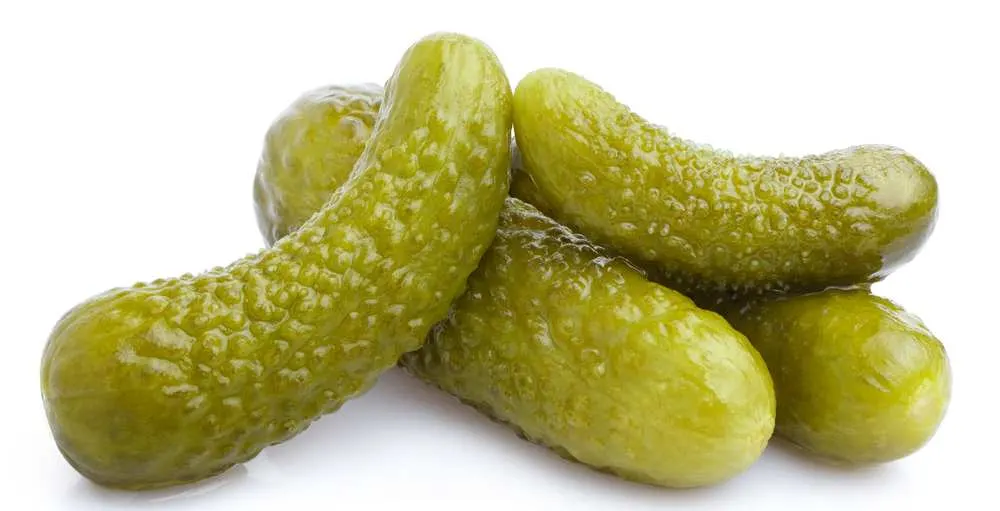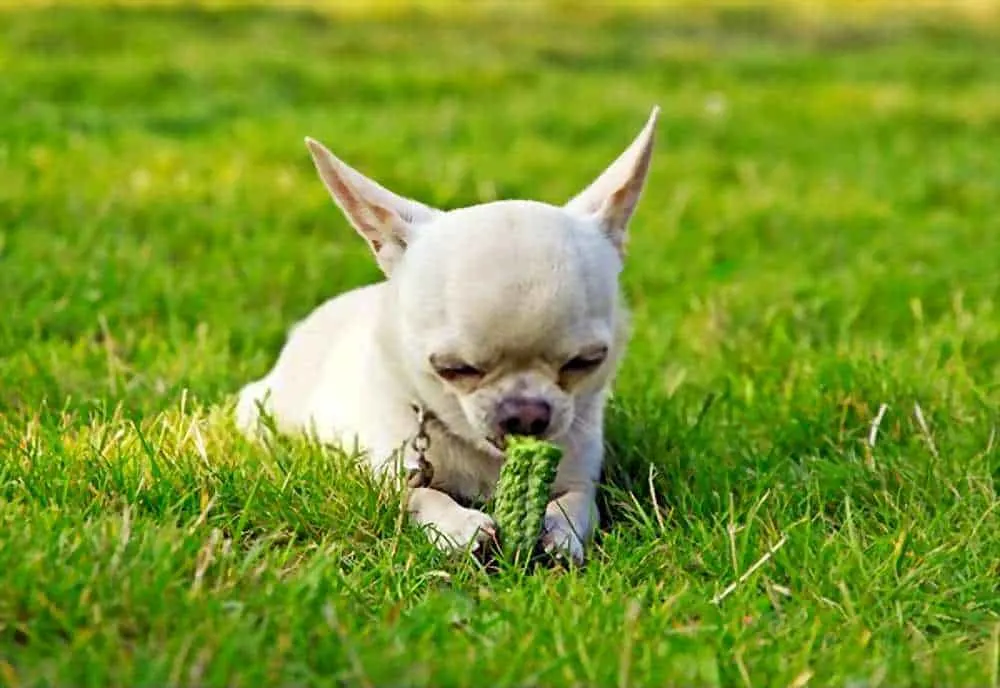Most dogs don’t really care for pickles. However, there are always exceptions, and there are some dogs that will eat anything that their people are eating, then beg for more or something better.
I’ve had dogs who carefully sniff everything and will only partake of what they favor, and I’ve had dogs who enthusiastically swallow whatever is offered. Humans consume pickles as sandwich toppings, chopped up in various recipes, or whole as a snack. Some dogs will beg for their share of the salty or sweet treat.
But should these foods be offered to our canine pets? Opinions vary. There may not be an absolute right answer, depending on the pickle of choice. Here are some pickle basics to help you decide what’s best for your doggy friend.

What’s In A Pickle?
There are many kinds of pickles. Dills is probably the most eaten as a garnish or side. But sweet pickles or pickle relish and bread and butter pickles are also popular. There are as many ingredient variations as there are store brands, and don’t forget Mom’s homemade pickle recipe.
Three ingredients just about all pickle recipes will have in common are cucumbers, salt, and vinegar. Even sweet pickles will include these ingredients to some extent. In addition to these three will be a list of herbs and spices, some of which may be okay for your dog, and others not.
Cucumbers
Cucumbers are not dangerous for dogs to eat. In fact, cucumber slices make an excellent, low-calorie treat that some dogs love. Cucumbers also contain vitamin C and other nutrients, which are good for both dogs and humans.
So you could just give your dog raw cucumber instead of pickles to avoid any questions about harmful ingredients. It’s not recommended that you give your dog a whole cucumber to chew on, however, as it can be a choking hazard.
It should be mentioned here that cucumbers are not the only food that may be pickled. Some pickled food may be toxic for your pet, so get all the facts before offering them to your dog.
Salt
Although a small amount of salt is important to both people and dogs for a healthy metabolism, too much can be equally dangerous. Dog food generally carries plenty of sodium to meet your dog’s metabolic needs. Adding more can be extremely unhealthy and can lead to salt poisoning with symptoms ranging from diarrhea to seizures.
Remember that dogs process foods differently than people, and smaller dogs’ systems can become oversaturated with toxins very quickly. So if your dog loves salty pickles, it is best to limit them to an occasional small treat for safety’s sake.
Vinegar
This is the taste that will most often deter dogs from eating pickles. However, vinegar is safe for dogs, and maybe added to pet water as a digestive aid or made into a natural bug repellant for outdoors.
The ingredient label may specify whether apple cider or distilled vinegar has been used in the pickling process. For health purposes, unfiltered apple cider vinegar is best. That is not the kind generally used for pickling, which limits its nutritional contributions to your dog’s health.
Onions
Onions are toxic for dogs. Eating onions can affect your dog’s red blood cells, causing anemia and other health complications. And other onion relatives such as shallots and garlic can cause the same type of reaction.
Bread and butter pickles are often a combination of cucumbers and onions, making them unsafe for your dog to consume. Some dill pickles may also be processed with garlic and should be avoided. If your dog loves pickle treats, read the ingredients carefully in order to avoid any foods from the allium family.
Sugar, Herbs, and Spices
Dogs can become addicted to sugar just like people can, and with many of the same negative results. Sweet pickles may have more appeal to some dogs than dills, but they should not be given as a daily treat. Excessive sugar can affect your dog’s blood sugar levels and lead to obesity and tooth decay.
The Dill herb is actually very healthy for dogs. It can help fight bad breath, lessen flatulence, and contains cancer-fighting nutrients. But you don’t have to feed your dog pickles to reap the benefits of this herb. You can mix a bit into your dog’s regular food as a diet supplement.
Research any and all ingredients, including common spices, that may be included in pickles you are considering as a treat for your pooch. Some may be harmless, others, dangerous. Keeping your pet safe from toxic additives is an important part of maintaining their overall health for the best quality of life.

Play it Safe
So there’s no absolute yes or no answer as to the safety of feeding your canine companion pickles. Most sources agree that they are safe as an occasional treat, but not for habitual consumption. Although some pickles may contain important nutrients, eating them does not necessarily add any more quality to your pet’s diet than is contained in their daily pet food.
For the sake of maintaining and extending the time you will have to enjoy your pet, don’t feed them any foods that may affect their health either immediately or over time. Your canine companion is trusting you to make the best choices for them, so don’t be swayed by adoring or pitiful looks.
Pickles are great people treats. Your dog may even snag a few during its lifetime without coming to any grief. But overall, pickles probably shouldn’t be part of any dog’s regular diet or treats. Don’t offer them or tease your dog into eating them unless you are convinced they will come to no harm.
Always try to be aware of all ingredients included in the human food you allow your pet to eat. If you enjoy sharing a snack with your puppy pal, choose healthy foods that will benefit you both in the long run.
Learn More: What Can Dogs Eat? A Comprehensive List Of Dog-safe Foods


